Chapter 9
Strengthening democracy

 View photo caption
View photo caption
In 2024, the European Union’s institutions and bodies worked closely together to address the common interests of the EU and deliver results for its citizens. Efforts continued in relation to improving the EU’s lawmaking process and reforming administrations so they are better prepared for the opportunities and challenges of a changing world. Work also advanced on building more resilient democracies across the EU by promoting free and fair elections, strengthening media freedom and countering disinformation. Achieving better results for citizens by improving EU rules is a shared objective, and is the responsibility of all the EU institutions and Member States. This includes empowering citizens to participate actively in the democratic process.
Strong institutions
The EU’s institutional set-up is unique, and its decision-making system is constantly evolving. In principle, the European Commission proposes new laws in line with the political direction of the European Council, and the European Parliament and the Council of the European Union, as co-legislators, adopt them. The Member States then implement the laws, and the Commission ensures that they are properly applied. The work of these institutions is complemented by other institutions and bodies.
The presidency of the Council rotates between the Member States every six months. In 2024, the presidency was held first by Belgium and then by Hungary.



The EU’s institutional cycle begins anew every five years with the elections to the Parliament. These elections and the subsequent appointment of a new Commission are essential parts of the EU democratic process as set out in the treaties - open a new tab.. In the last year of the 2019–2024 cycle, the EU institutions successfully delivered on their ambitious objectives set for that period, and prepared the ground for the smooth beginning of the new 2024–2029 political cycle (see Chapter 0).
The proper functioning of EU interinstitutional processes, including the involvement of the Member States’ national parliaments and the EU’s consultative committees and decentralised agencies, is key to the success of EU policymaking. In 2024, the European Economic and Social Committee and the European Committee of the Regions focused on enhancing their cooperation with civil-society actors and local and regional authorities in the EU candidate countries to prepare for a possible future enlargement of the EU. At the same time, the EU institutions continued their reflections on the reforms needed - open a new tab. to help the EU become fit for the future, when it comes to both further enlargements and the need to respond to increasingly complex global challenges.
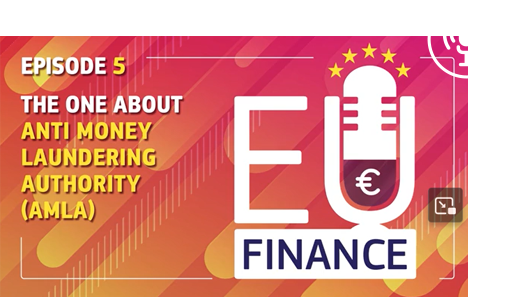
In June, a new decentralised agency was created to better protect EU citizens and the EU’s financial system against money laundering and to counter terrorist financing. The Authority for Anti-Money Laundering and Countering the Financing of Terrorism - open a new tab. is one of a number of agencies across the EU that contribute to the implementation of EU policies.

Strategic foresight
Strategic foresight - open a new tab. supports the EU’s forward-looking policymaking and strategic planning by exploring future trends that are likely to have a significant impact on the EU. It helps anticipate both risks and opportunities that will shape Europe’s future. The 2024 global trends report - PDF file, open a new tab. – a joint project by nine EU institutions and bodies under the European Strategy and Policy Analysis System – outlines the key medium- and long-term trends and provides insights to EU leaders on the main strategic choices for the years to come (see Chapter 0).
During the year, the EU institutions strengthened their cooperation with the Member States on EU-level strategic discussions thanks to the EU-wide Foresight Network. Related to this are efforts to modernise public administrations across Europe, which continued in 2024 under the ComPAct - open a new tab. initiative. In addition to helping Member States address skills gaps and deliver on the target of having 100 % of key public services accessible online by 2030, the initiative also aims to make public administrations less bureaucratic, faster in delivering services, more transparent and closer to the people. In 2024, the initiative also supported national and regional administrations (e.g. in Italy, Lithuania and Malta) in building foresight capacity and using foresight techniques to develop new policy approaches in areas such as health, social policy and education.
The EU institutions and bodies continued to invest in their foresight capacity. For instance, the European Economic and Social Committee established its internal strategic foresight framework, and the European Committee of the Regions strengthened foresight cooperation with interested regions. By anticipating emerging challenges and opportunities, these efforts ensure that policies are future-proof and will continue to improve the quality of life of current and future generations of citizens.
Good administration
Transparency, integrity and accountability are the key characteristics of a democracy based on the rule of law. They promote good governance and build trust in the policymaking process.
To further strengthen public trust in the EU institutions and bodies and to create a common culture of ethics, eight of them signed an agreement - open a new tab. to establish an interinstitutional ethics body - open a new tab. with a mandate to develop common standards for the ethical conduct of their members and to establish a formal mechanism for the coordination of ethical requirements.
The revamped DORIE - open a new tab. (Documentation and Research on European Institutional Issues) database now allows users to search for documents on EU institutional matters in all official EU languages.
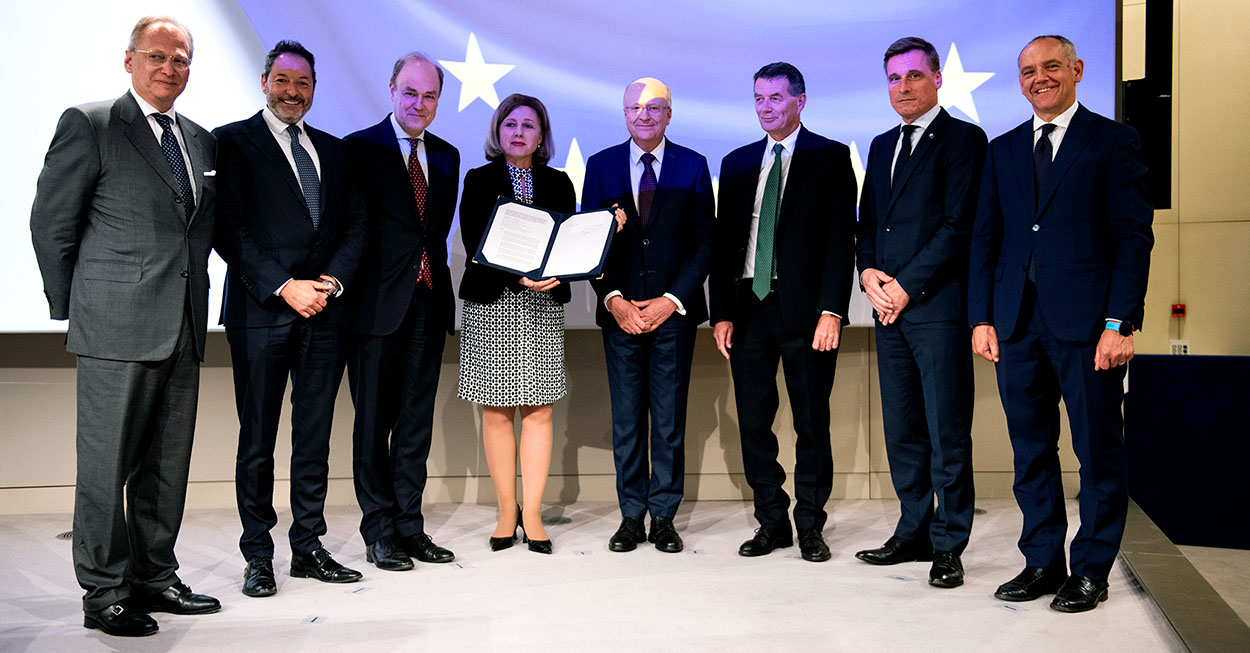
The European Ombudsman - open a new tab. is the body responsible for investigating complaints about maladministration in the activities of the EU institutions. In 2024, cases finding maladministration were very rare (around 5 %), and about three quarters of the Ombudsman’s recommendations were successfully implemented.
Through its Better Regulation - open a new tab. agenda, the EU also continued its work to ensure efficient and effective legislation and reduce administrative burdens without undermining policy objectives. The ‘one in, one out’ approach ensures that any newly introduced burden is offset by removing an equivalent burden in the same policy area. The approach complements the Regulatory Fitness and Performance programme - open a new tab., which seeks to systematically identify and remove red tape and unnecessary costs whenever EU legislation is revised and evaluated.
Efforts also continued to enhance the environmental performance - open a new tab. of EU institutions, save energy and optimise the use of resources.
2024 simplification/
rationalisation initiatives
Expected
savings/benefits
2024 simplification/
rationalisation initiatives
Expected
savings/benefits
€165 million reduction in administrative costs
2024 simplification/
rationalisation initiatives
Single portal for declaring the posting of workers - open a new tab.
Expected
savings/benefits
€259 million reduction in administrative burden
2024 simplification/
rationalisation initiatives
Simplified recognition process thanks to the Drinking Water Directive - open a new tab.
Expected
savings/benefits
€530 million in savings per year
2024 simplification/
rationalisation initiatives
Expected
savings/benefits
€120 million in savings per year
2024 simplification/
rationalisation initiatives
Support for sustainability reporting and due diligence - open a new tab.
Expected
savings/benefits
Prevention of a spillover effect on small and medium-sized enterprises and overcompliance
Making sure that EU rules are applied
The groundbreaking laws adopted during the 2019–2024 cycle, such as those helping the green and digital transformations of our societies, will only achieve their intended effects and benefits if they are fully implemented and properly applied. The Commission has the role of ensuring that this is done by all Member States in the first place through preventive measures and, if necessary, by opening infringement procedures - open a new tab.. The purpose of an infringement procedure is to ensure that Member States correctly apply EU law. Particular emphasis is put on violations that affect many people or businesses. Where the identified breaches cannot be remedied, the Commission may refer the cases to the Court of Justice of the European Union, which may impose financial sanctions on the Member State in question.
- 568 new infringement procedures were opened in 2024.
- 52 cases were referred to the Court concerning 19 Member States.
- Financial sanctions were requested in 10 cases.
- 542 infringement procedures were closed.
- 93 % of them in the early stages of the procedure, saving time for people and businesses.
- These measures will bring concrete benefits across different policy areas and will result in better protection of consumer and citizen rights.
The EU continued its work to prevent breaches from happening in the first place by providing early support to Member States on the implementation of EU law through practical guidance, meetings, training and technical assistance in all main policy areas. For example, through the Accele-RES initiative - open a new tab., the Commission helped Member States to implement the revised Renewable Energy Directive, facilitating the digitalisation of national permitting processes. This initiative includes financial and technical support, guidelines and regular exchanges on implementation.
2024 also saw increased efforts to improve cross-border law enforcement with a proposal for new rules - open a new tab. against unfair trading practices in the agricultural sector. The rules will strengthen the position of the weakest actors in the supply chain, notably farmers (see also Chapter 4). It will do so by ensuring that enforcement authorities have the necessary tools to investigate, gather evidence and take measures against buyers located in another Member State.

The EU also continued funding the training of the judiciary and judicial staff in civil and criminal matters in line with the European Judicial Training Strategy - open a new tab.. The strategy promotes joint training events for staff from several Member States to enable networking and enhance mutual trust. The aim is to strengthen cross-border judicial cooperation and ensure the standardised application of laws across the EU.
Upholding the rule of law
In an increasingly unstable and polarised world, it is vital that democracy, fundamental rights and the rule of law be proactively defended and upheld, in the EU and beyond. The 2024 Rule of Law Report - open a new tab., as a preventive tool, made an important contribution to this, showing that 68 % of the recommendations issued to Member States in 2023 had been fully or partially addressed. This reflects the significant efforts that are ongoing in the Member States to undertake the necessary reforms to strengthen the rule of law in key areas such as the justice system, the anti-corruption frameworks, media pluralism and freedom, and institutional checks and balances. The 2024 report was extended to four enlargement countries (Albania, Montenegro, North Macedonia and Serbia) to support their reform efforts. The report provides the basis for regular dialogue among ministers in the General Affairs Council - open a new tab. and among Members of the European Parliament. The Commission is also organising national rule-of-law dialogues with stakeholders in the Member States.

Another important EU tool - open a new tab. to protect the rule of law against breaches by Member States is the possibility to reactively trigger Article 7 of the Treaty on European Union. This procedure, which can ultimately result in the suspension of membership rights, was initiated against Poland in 2017 and Hungary in 2018. In 2024, the procedure was closed - open a new tab. for Poland after the country introduced substantial measures to protect judicial independence and renewed its commitment to address the serious rule-of-law concerns through a dedicated action plan - open a new tab.. This led the Commission to conclude that there was no longer a clear risk of a serious breach of the rule of law in Poland. The procedure - open a new tab. remains open for Hungary.
Defending democracy
In a healthy and thriving democracy, citizens can freely express their views, choose their political leaders and have a say about their future. Democracy in the EU is strong, but it faces challenges, such as rising extremism; election interference; the spread of manipulative information; and threats against journalists, media freedom and pluralism. The defence of democracy - open a new tab. package, adopted at the end of 2023, aims to address challenges such as foreign interference and to build resilience from within by encouraging civic engagement and democratic participation. A key element of the package is the proposal - open a new tab. to enhance transparency and democratic accountability by shedding light on covert foreign influence. In 2024, the Parliament and the Council started discussing this proposal. The measures will also improve the functioning of the Single Market through common standards for interest-representation activities carried out on behalf of non-EU countries.
In addition, the package includes two recommendations: one to strengthen electoral processes - open a new tab. in the EU and another to promote the inclusive participation - open a new tab. of citizens and civil society in policymaking. In line with the first recommendation, a Code of Conduct for the 2024 European Parliament elections was developed and presented in April to ensure the integrity of the elections and fair campaigning. The comprehensive checklist was agreed to by all European political parties, enhancing the efforts to prevent foreign interference and information manipulation.
Similarly, the new rules - open a new tab. on the transparency of political advertising, adopted in March, will support accountability in the use of political ads, protect fundamental rights and help counter information manipulation and foreign interference in elections. Under the new rules, political adverts will need to be clearly labelled and must include information such as who paid for them and how much; to which election, referendum or regulatory process they are linked; and whether they are targeted.
In 2024, the EU continued to protect and promote human rights worldwide. For example, under the Human Rights and Democracy Thematic Programme - open a new tab. (amounting to €1.5 billion), the EU supported the Global Initiative Against Impunity, a civil-society-led initiative against international crimes and serious human rights violations.

The 2024 Sakharov Prize for Freedom of Thought - open a new tab. – the highest tribute paid by the EU to human rights work – was awarded to María Corina Machado and President-elect Edmundo González Urrutia for their brave fight to restore freedom and democracy in Venezuela.
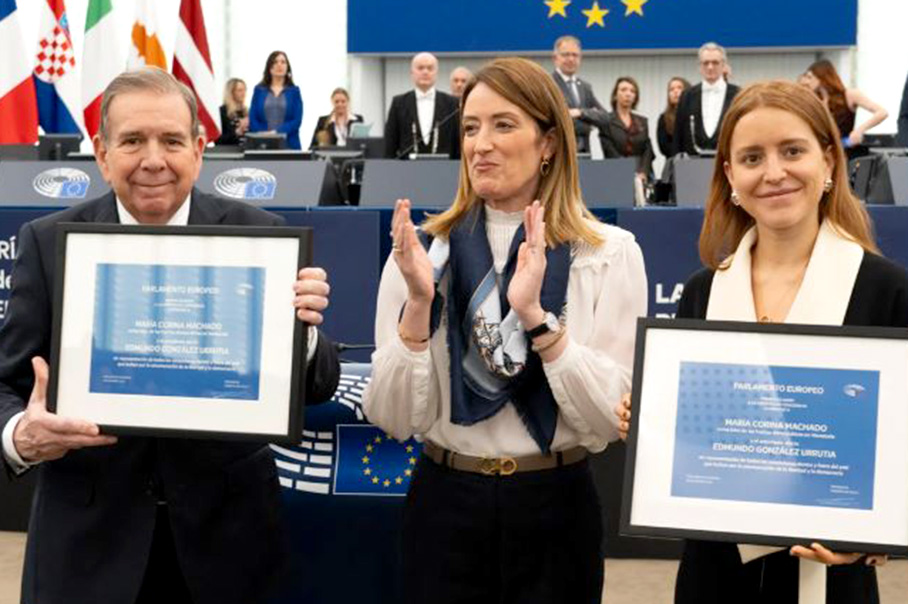
Media freedom
Independent media act as a public watchdog, holding those in power accountable. They are a key pillar of European democracy and must be protected. The European Media Freedom Act - open a new tab., which entered into force in May, aims to better protect media and journalists against political interference and to ensure that they can operate more easily across borders. Most of its provisions will start to apply as of August 2025.
In April, the EU also adopted new rules to protect journalists and human rights defenders against abusive lawsuits meant to silence them. The rules aim to prevent unfounded or abusive legal actions, known as strategic lawsuits against public participation - open a new tab., or SLAPPs, that aim to silence those participating in public debate on matters such as fundamental rights, the environment and public access to information. For the first time ever, a system of powerful procedural safeguards for cross-border cases are in place. These safeguards will equip courts to deal with abusive litigation, and will also deter potential claimants from engaging in such practices. Work also continued on the implementation of the related Anti-SLAPP Recommendation - open a new tab., covering applicable frameworks, training, awareness raising and support mechanisms, along with data collection, reporting and monitoring.
- 8 projects funded through the Journalism Partnerships action of the Creative Europe programme.
- €12 million to support the resilience of the news media sector.
- €6 million earmarked for other projects to enhance media freedom and pluralism in the EU.
Countering information manipulation
The EU institutions are strengthening their response to disinformation and to foreign information manipulation and interference targeting EU policies and European democracy.
Action is centred around four key areas
- Developing policies to strengthen European democracies, making it more difficult for disinformation actors to misuse online platforms and protecting journalists and media pluralism.
- Countering foreign interference and cyberattacks through awareness-raising projects, advanced technological solutions and improved coordination.
- Building societal resilience against disinformation through media literacy and awareness raising.
- Cooperating with institutions, national authorities, civil society and other organisations.
In 2024, efforts included raising situational awareness via the Integrated Political Crisis Response - open a new tab. mechanism and dedicated campaigns targeting citizens.
With half of the world’s population having the opportunity to go to the polls in 72 countries in 2024 – the biggest election year in history – particular focus was placed on strengthening awareness raising and protecting election integrity, especially linked to the European elections in June.
The European Cooperation Network on Elections held a number of events to exchange practices to combat disinformation.

Ahead of the European elections, the Commission launched a joint communication campaign with the European Regulators Group for Audiovisual Media Services to inform citizens about the related risks, encouraging critical thinking and providing practical tips on how to spot and tackle disinformation.
In March, the Commission published guidelines on recommended measures for very large online platforms and search engines to mitigate systemic risks that may impact the integrity of elections. A post-election report - open a new tab. published in July found no evidence of any major disinformation or foreign interference in the European elections. A comprehensive report on the elections will follow in 2025.
The major online platforms and signatories to the Code of Practice on Disinformation - open a new tab. reported on the measures they had taken to protect the integrity of the European elections. These included requiring advertisers or creators to clearly label any image, video or audio file that had been digitally created or altered; cooperating with fact-checking organisations; promoting high-quality and authoritative information to voters; and developing targeted media literacy and pre-bunking campaigns.
During the year, the Commission renewed its support for important initiatives to counter disinformation, namely the European Digital Media Observatory hubs - open a new tab.. The observatory and its hubs played a key role in monitoring and exposing disinformation campaigns, raising awareness and promoting media literacy in advance of the European elections.
The EU continues to support Ukraine’s information resilience and outreach towards global partners, notably to promote Ukraine’s Peace Formula - open a new tab.. To do this, the EU uses a whole-of-society approach, working with government institutions, civil society, media organisations and online platforms. To help curtail the reach of Russian information manipulation and propaganda, the EU has suspended the broadcasting activities of numerous Russian state-owned and pro-Kremlin disinformation outlets. With the entry into force of the Digital Services Act, providers of very large online platforms and search engines need to evaluate the potential societal risks posed by their services. These include threats to freedom of expression and the risk of their services being used for disinformation campaigns.
Regular exchanges on the Ukraine war continue with signatories to the EU Code of Practice on Disinformation - open a new tab.. The European Digital Media Observatory and its national and regional hubs continue to monitor and debunk war-related disinformation - open a new tab., including tracking its share - open a new tab. of the total volume of disinformation circulating in the EU. This is complemented by wider efforts to fight disinformation, such as the EUvsDisinfo - open a new tab. campaign, which is estimated to have reached over 20 million people in 2024, and the Rapid Alert System - open a new tab., which facilitates the sharing of insights relating to disinformation campaigns and helps coordinate responses.
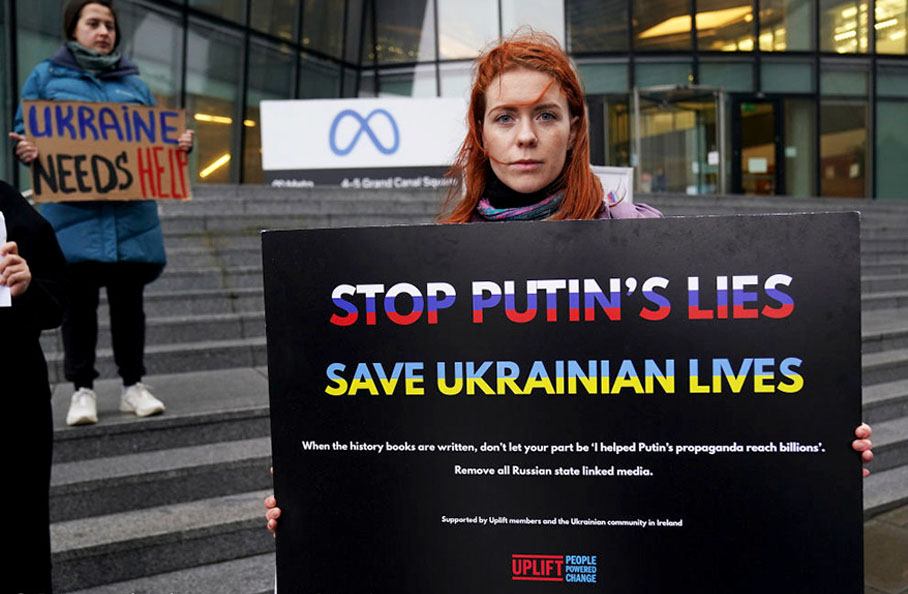
© Brian Lawless/PA Images via Getty Images
Empowering citizens
The EU is committed to listening closely to citizens and stakeholders and opening up policymaking processes to the public. This is another way to help the EU become more transparent, accountable and effective. The Have Your Say - open a new tab. hub offers citizens and stakeholders access to the three main channels for citizen engagement: public consultations and feedback - open a new tab.; the European Citizens’ Initiative; and the European Citizens’ Panels - open a new tab.. As of 2024, citizens can also actively engage with one another, civil society and other stakeholders via the Citizens’ Engagement Platform - open a new tab..
Citizen engagement in 2024
27 public consultations launched.
Feedback on:
- 60 calls for evidence documents,
- 12 legislative proposals,
- 131 draft implementing and delegated acts.
11 new european citizens’ initiatives registered.
They called for action in various areas: agriculture, food and water security; safe abortion; consumer rights of video gamers; etc.

30 000
replies/comments
received from citizens and interested parties.
2 european citizens’ panels on:
- how to tackle hatred in society, resulting in 21 recommendations - PDF file, open a new tab.;
- how to bring benefits of energy efficiency to citizens, public authorities and enterprises, resulting in 13 recommendations - PDF file, open a new tab..
Both sets of recommendations will contribute to shaping future EU initiatives.
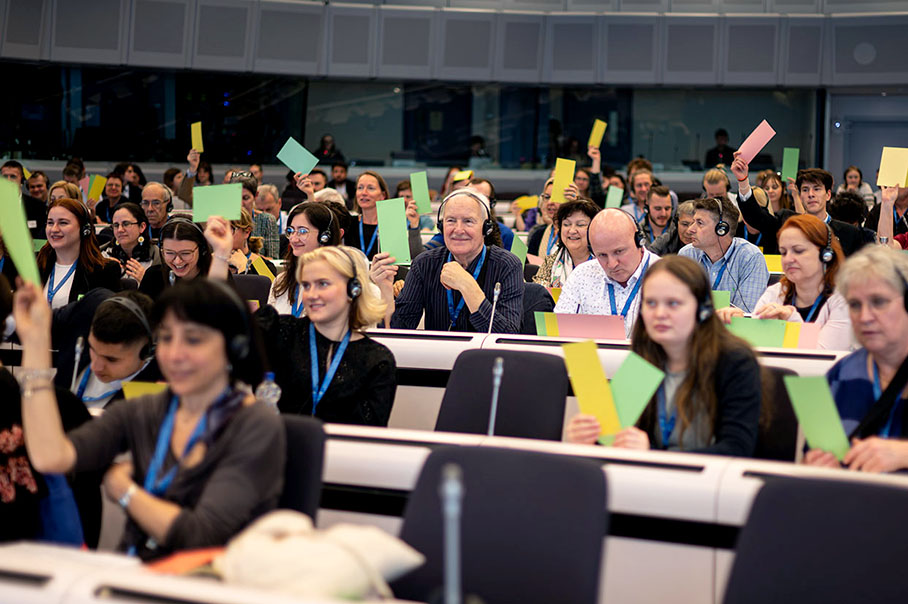
The EU Prize for Citizen Science - open a new tab. connects science with society, encourages public involvement and builds trust in scientific progress. In 2024 it was awarded to three projects, focusing on marine pollution, agricultural biodiversity and mental health.

© Adobe Stock
Grand Prize,
€60 000
INCREASE - open a new tab., for advancing knowledge on seed preservation through the empowerment of civil society and citizens, in particular in rural areas.

© Adobe Stock
Digital
Communities prize,
€20 000
CoAct for Mental Health - open a new tab., for its use of digital technologies to develop a personalised approach and improve quality of life for people facing mental health problems.

© Adobe Stock
Diversity &
Collaboration prize,
€20 000
SeaPaCS – Participatory Citizen Science against Marine Pollution - open a new tab., for producing transformative knowledge that filled the existing cognitive and emotional gaps between society and the sea.
Empowering consumers
Thanks to the EU’s consumer protection rules, consumers are well protected and entitled to receive clear information on the products and services they are buying. As of 13 December, new rules - open a new tab. ensure that all non-food products on the EU market are safe by design. The new rules seek to address major societal and market changes that have affected consumer product safety in the past two decades and to better ensure that all kinds of products are safe, whether they are sold offline or online. Furthermore, new rules will empower consumers for the green transition, allowing them to choose longer-lasting and more repairable products (see Chapter 4).
Empowering children and young people

To become active citizens, young people need to understand how democracy works and what their rights and responsibilities are. They also need to be given specific tools to engage with decision-makers. With this in mind, the Youth Policy Dialogues - open a new tab. and the Youth Sounding Board - open a new tab. offer the possibility for young adults to make their voices heard, while the EU’s Children’s Participation Platform - open a new tab. provides a safe space for 10–17-year-olds to have their say on the European laws and policies that concern them. In 2024, more than 1 000 children were actively consulted on the Recommendation on Integrated Child Protection Systems - open a new tab..
During the year, the EU announced 60 measures - open a new tab. that will give young people a greater say in the decisions that affect them and deepen the youth dimension in a range of EU policies. One of these measures is the ‘youth check’ to ensure that the impact on young people is systematically factored in when designing new EU policies.
Citizens of all ages and backgrounds should play a leading and active part in setting the priorities for and the level of ambition of the EU’s policies. The more they participate in designing policy, the more effective and efficient EU laws will be in making a difference to people’s lives. This is why the EU institutions have been actively working on giving Europeans a stronger role in EU policymaking, and will continue to do so under the new political cycle (see Chapter 0).
What do children think about democracy?
Children and teenagers
would like:
- a bigger role in influencing decisions that directly affect their lives;
- more information about the democratic process and encouragement to take part in it.
Source: Survey on democratic participation - open a new tab., spring 2024.
- 1 921 children from 23 Member States answered the online survey.
- 28 children and 3 young activists were interviewed.
- 122 children participated in focus groups.